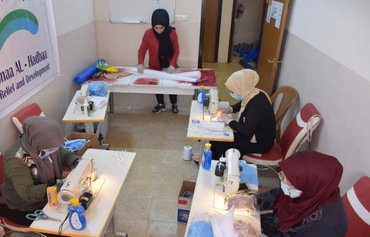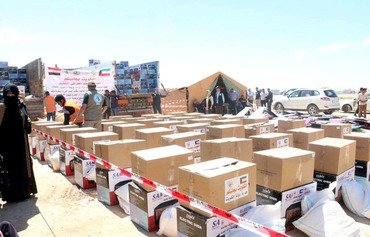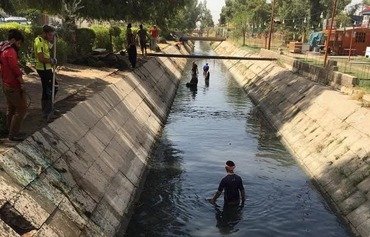The Iraqi government has been taking various steps to support women who have been affected by terrorism, through mechanisms that include the payment of stipends, as well as access to loans and social services.
Though support programmes have eased the burden for thousands of displaced women, widows and victims of violence, their suffering remains significant, Iraqi activists and officials told Diyaruna.
Ruqaya Mahmoud (Um Alya), a widow with three daughters, spent nearly two years in al-Qayyarah displacement camp after her husband was killed by the "Islamic State of Iraq and Syria" (ISIS) when the group overran Mosul.
She and her daughters returned to their home in eastern Mosul a year ago.
![Iraqi and foreign officials discuss ways to support women in areas of the country that were liberated from ISIS, on March 25th, 2019. [Photo via the website of the Iraqi Cabinet Secretariat]](/cnmi_di/images/2020/06/10/24374-iraqi-women-officials-600_384.jpg)
Iraqi and foreign officials discuss ways to support women in areas of the country that were liberated from ISIS, on March 25th, 2019. [Photo via the website of the Iraqi Cabinet Secretariat]
A skilled cook, Um Alya prepares meals in her small home kitchen and sells them to customers in her neighbourhood, using her earnings to support her daughters.
Though she makes very little money, she told Diyaruna, the income she earns from selling food is "better than nothing".
"I have no salary, and my relatives have their fair share of problems," she said. "So I try to get by on my own and cover my daughters' needs."
Need for humanitarian aid
The UN estimates that over the past year, nearly 3.3 million Iraqi women and girls have required humanitarian aid -- a figure that indicates the seriousness of the negative repercussions of years of war and terrorism on women.
Iraqi women have borne the brunt of the burden, said Abeer al-Chalabi, who heads the Ministry of Labour's Children and Women's Authority.
After the war on ISIS, she told Diyaruna, the situation has become worse for women, many of whom have been displaced or widowed, serve as breadwinners for their families, or have otherwise suffered as a result of terrorism.
Displaced women "are the worst off", al-Chalabi said, as the living conditions inside displacement camps are very poor, and women are not protected.
"Even the women who have left these places are not better off, and many of them suffer from hardship," she said.
The ministry "has several programmes that support this vulnerable segment of the population through monthly social security payments for thousands of women, especially those affected by terrorism and the poorest", she said.
Subsidies and soft loans also are available for women to help them start small businesses, as are vocational training courses, al-Chalabi said, though these programmes alone are not enough to end women's suffering.
"The responsibility does not fall on the shoulders of a particular ministry or government agency but on the parliament, through the enactment of laws and activation of legislation that secures women's rights," she said.
Civil society organisations and private sector partnerships also have a role to play, she added, and "are important in achieving the desired progress".
A difficult issue to resolve
Former Iraqi MP Pascale Warda, a women's rights activist, said the government is taking serious steps to support women, "and we can see this through our work and meetings with government officials".
The hardship created by violence and acts of terrorism is difficult to resolve, she told Diyaruna, "as there are scores of widows and those entitled to assistance".
"Regardless of how significant those services are, they still cannot be extended to everyone, nor is the positive impact that clear," said Warda, who now heads the Hamourabi Human Rights Organisation.
Children with special needs and those in households without a breadwinner are also in need of additional support, she said.
The Ministry of Migration and Displacement "spares no effort in helping all women", said Azim Hazim, deputy director of the ministry's Ninawa branch.
Looking after displaced women and returnees is at the heart of the ministry's work, he told Diyaruna.
Grants and services for women
This year, the ministry has granted nearly 100 women returnees in Mosul soft loans to help them start income-generating businesses.
These run the gamut from sewing businesses, hairdressing to opening small shops and providing professional rehabilitation services for women who seek to develop their own capabilities, he said.
The ministry is providing grants to support returnees, including a large number of women who need money to rebuild their lives and resettle in their neighbourhoods, he said.
He noted that with regard to displaced women, there is constant monitoring from the ministry and camp administrations of their social, health and psychological conditions, in addition to meeting their essential needs.
This includes providing them with relief supplies, and enrolling them in support programmes.

![An Iraqi woman receives food aid on April 27th. [Photo courtesy of Iraqi Ministry of Migration and Displacement]](/cnmi_di/images/2020/06/10/24373-aid-iraq-women-600_384.jpg)






